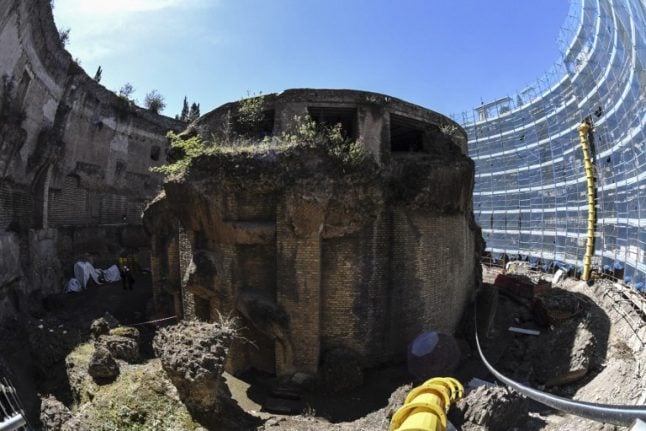The Mausoleum of Augustus – the biggest ever built by the Ancient Romans – was originally built in 28BC as the final resting place for Rome's first emperor. Measuring 90 by 45 metres, the stucture originally boasted an elaborate roof featuring a bronze statue of Augustus himself.
It also houses the remains of his successors, Emperors Vespasian, Nero and Tiberius, and over the years has been reincarnated as a concert hall, fortress, and bullfighting stadium.
But as the centuries passed, the towering structure was battered by cannon fire, bombs, looting, and ill-advised building projects, before being closed off to the public and left to fall into disrepair in the 1960's.

Photo: Andreas Solaro/AFP
Today, it is covered with weeds and rubbish – but a €10 million-euro restoration now aims to restore it to its former glory.
The mega cleanup will be part-financed by phone company TIM, which is donating €6 million. Rome authorities and the Culture Ministry will foot the rest of the bill.
The first stage of the project will include clearing out the trees, weeds, and rubbish which have taken over the historic site, and cleaning up the structure as well as carrying out essential repair work to the brickwork and marble.
Workers will excavate parts of the site which have never yet been studied – meaning new treasures are likely be unearthed and shed light on life in Ancient Rome.

Photo: Andreas Solaro/AFP
Then, restorers will make the site tourist-friendly, adding new lighting and walkways for visitors to explore the mausoleum.
A planned “immersive” multimedia installation will tell visitors the story of the site – and the Roman Empire – as they walk, and there will be an onsite museum and shop. Workers hope to be able to put a covering over some of the pillars which will become a panoramic viewpoint.
On Tuesday, mayor Virginia Raggi visited the work in progress, where she said: “Rome is taking care of the riches left to us by history, and making them available to our citizens and to visitors from around the world.”
An insurance company announced in April that it would finance a restoration of Venice's Royal Gardens, just days after fashion house Gucci said it would fund a revamp of the Boboli Gardens in Florence. And food chain Eataly will pay for a restoration of Leonardo Da Vinci's painting The Last Supper.
Other sites to have received makeovers from private donors include Rome's Colosseum, Trevi Fountain, and Spanish Steps.
READ ALSO: All the latest news and features from Rome
Photo: AFP



 Please whitelist us to continue reading.
Please whitelist us to continue reading.
Member comments